Corporations Law: Good Faith, Proper Purpose, and Corporate Governance
VerifiedAdded on 2023/01/04
|10
|3175
|99
Essay
AI Summary
This essay delves into the critical concepts of 'good faith' and 'proper purpose' within the framework of Australian corporations law, specifically referencing the Corporations Act 2001 (Cth). The essay examines the legal definitions of these terms, as well as their significance in the context of director's duties and corporate governance. It explores the fiduciary obligations of directors, emphasizing the importance of acting in the best interests of the company. The discussion incorporates relevant case law, such as ASIC v Flugge & Geary [2016] VSC 779, to illustrate the practical application of these principles. Furthermore, the essay analyzes how 'good faith' and 'proper purpose' function as statutory mechanisms designed to promote transparency, accountability, and overall sound corporate governance practices. The essay also discusses the implications of these principles in ensuring directors’ actions align with the well-being of the company, avoiding conflicts of interest, and preventing improper use of directorial powers.
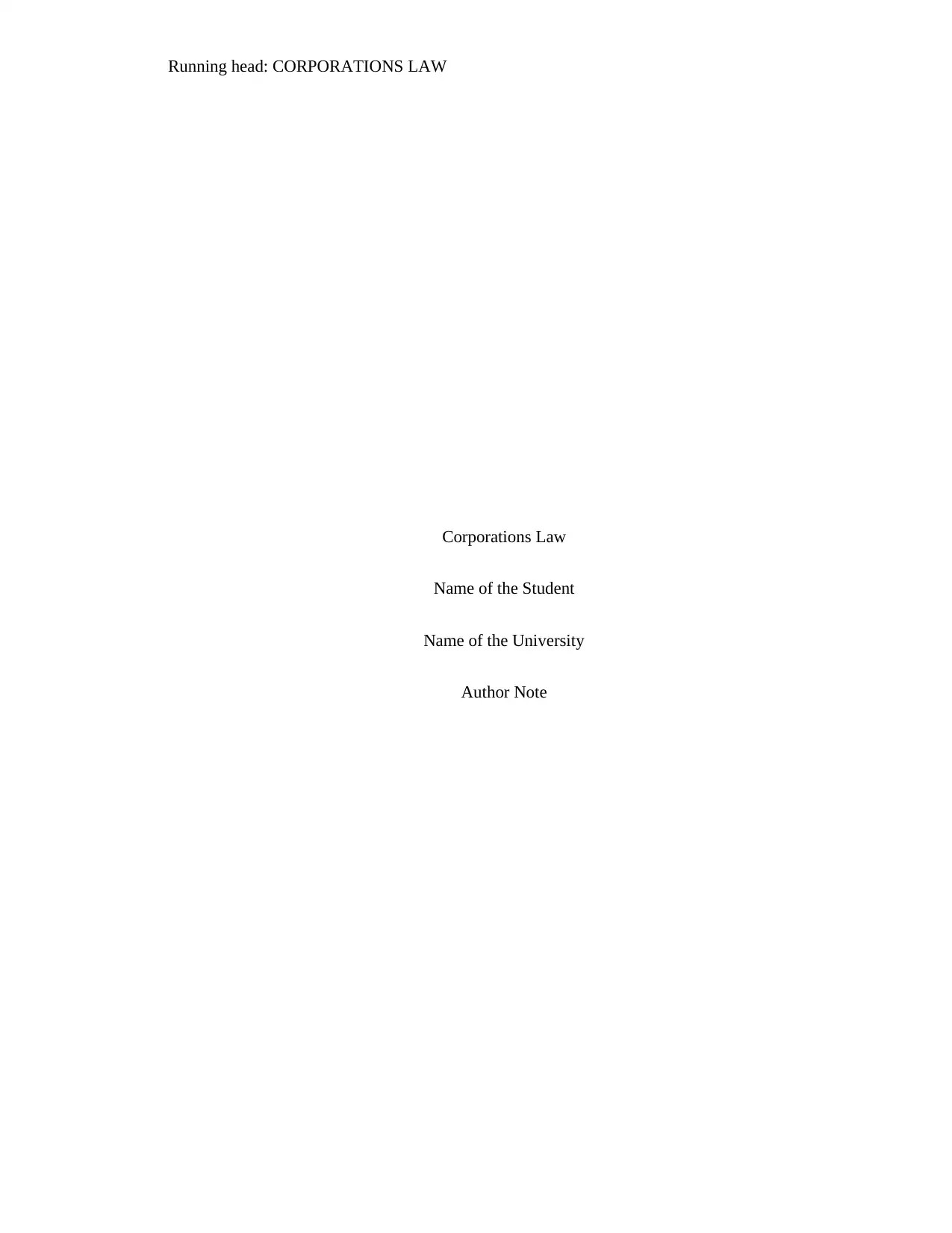
Running head: CORPORATIONS LAW
Corporations Law
Name of the Student
Name of the University
Author Note
Corporations Law
Name of the Student
Name of the University
Author Note
Paraphrase This Document
Need a fresh take? Get an instant paraphrase of this document with our AI Paraphraser
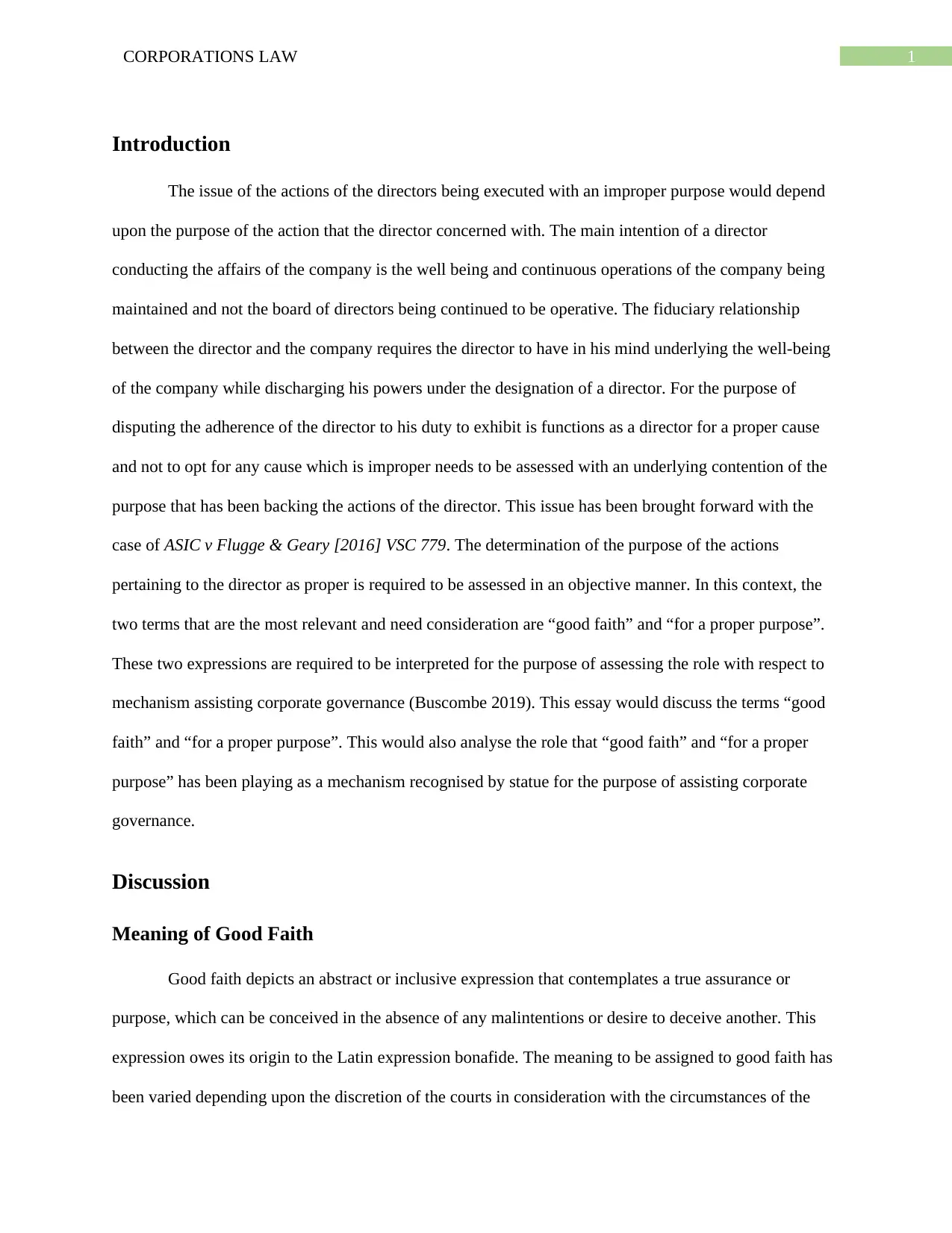
1CORPORATIONS LAW
Introduction
The issue of the actions of the directors being executed with an improper purpose would depend
upon the purpose of the action that the director concerned with. The main intention of a director
conducting the affairs of the company is the well being and continuous operations of the company being
maintained and not the board of directors being continued to be operative. The fiduciary relationship
between the director and the company requires the director to have in his mind underlying the well-being
of the company while discharging his powers under the designation of a director. For the purpose of
disputing the adherence of the director to his duty to exhibit is functions as a director for a proper cause
and not to opt for any cause which is improper needs to be assessed with an underlying contention of the
purpose that has been backing the actions of the director. This issue has been brought forward with the
case of ASIC v Flugge & Geary [2016] VSC 779. The determination of the purpose of the actions
pertaining to the director as proper is required to be assessed in an objective manner. In this context, the
two terms that are the most relevant and need consideration are “good faith” and “for a proper purpose”.
These two expressions are required to be interpreted for the purpose of assessing the role with respect to
mechanism assisting corporate governance (Buscombe 2019). This essay would discuss the terms “good
faith” and “for a proper purpose”. This would also analyse the role that “good faith” and “for a proper
purpose” has been playing as a mechanism recognised by statue for the purpose of assisting corporate
governance.
Discussion
Meaning of Good Faith
Good faith depicts an abstract or inclusive expression that contemplates a true assurance or
purpose, which can be conceived in the absence of any malintentions or desire to deceive another. This
expression owes its origin to the Latin expression bonafide. The meaning to be assigned to good faith has
been varied depending upon the discretion of the courts in consideration with the circumstances of the
Introduction
The issue of the actions of the directors being executed with an improper purpose would depend
upon the purpose of the action that the director concerned with. The main intention of a director
conducting the affairs of the company is the well being and continuous operations of the company being
maintained and not the board of directors being continued to be operative. The fiduciary relationship
between the director and the company requires the director to have in his mind underlying the well-being
of the company while discharging his powers under the designation of a director. For the purpose of
disputing the adherence of the director to his duty to exhibit is functions as a director for a proper cause
and not to opt for any cause which is improper needs to be assessed with an underlying contention of the
purpose that has been backing the actions of the director. This issue has been brought forward with the
case of ASIC v Flugge & Geary [2016] VSC 779. The determination of the purpose of the actions
pertaining to the director as proper is required to be assessed in an objective manner. In this context, the
two terms that are the most relevant and need consideration are “good faith” and “for a proper purpose”.
These two expressions are required to be interpreted for the purpose of assessing the role with respect to
mechanism assisting corporate governance (Buscombe 2019). This essay would discuss the terms “good
faith” and “for a proper purpose”. This would also analyse the role that “good faith” and “for a proper
purpose” has been playing as a mechanism recognised by statue for the purpose of assisting corporate
governance.
Discussion
Meaning of Good Faith
Good faith depicts an abstract or inclusive expression that contemplates a true assurance or
purpose, which can be conceived in the absence of any malintentions or desire to deceive another. This
expression owes its origin to the Latin expression bonafide. The meaning to be assigned to good faith has
been varied depending upon the discretion of the courts in consideration with the circumstances of the
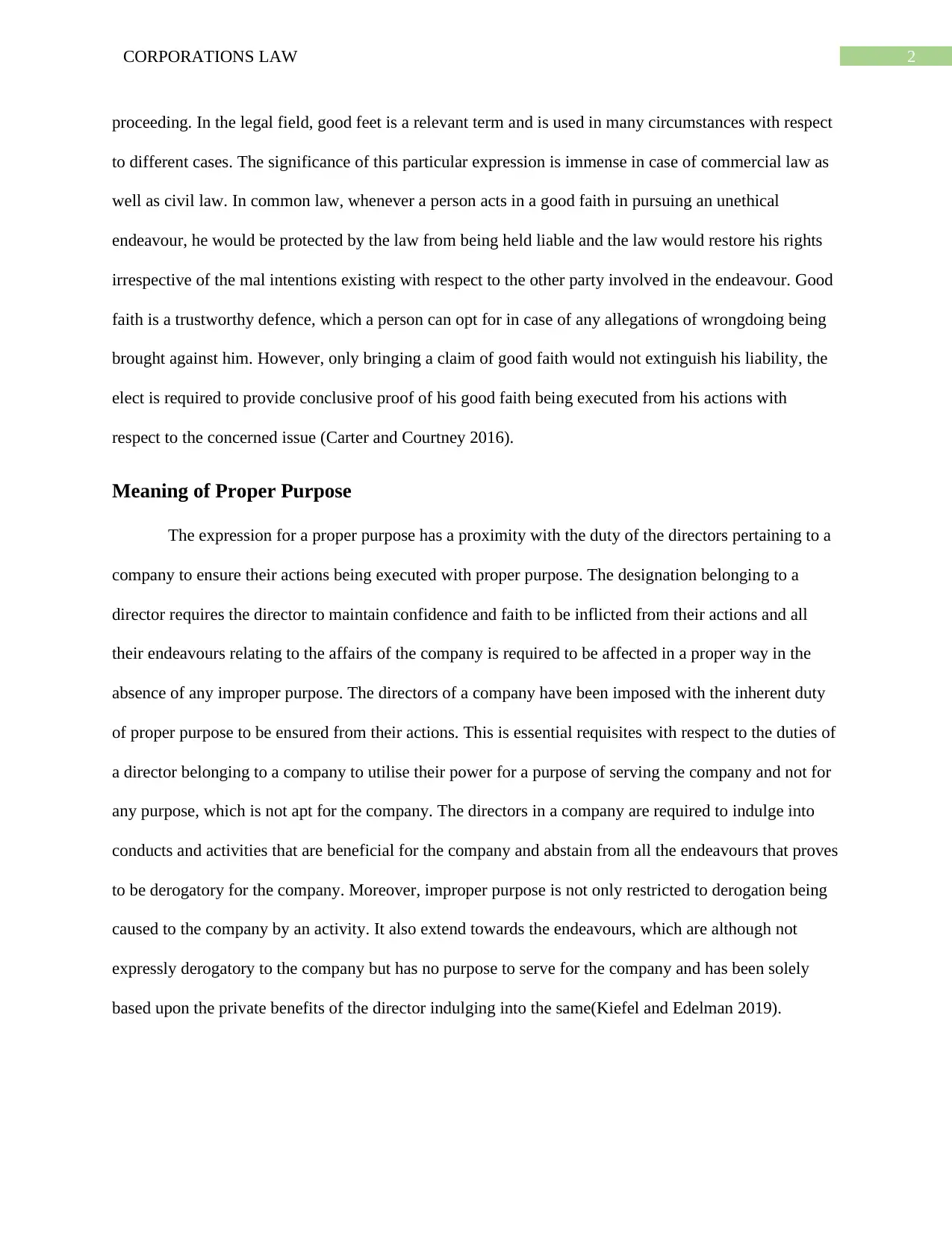
2CORPORATIONS LAW
proceeding. In the legal field, good feet is a relevant term and is used in many circumstances with respect
to different cases. The significance of this particular expression is immense in case of commercial law as
well as civil law. In common law, whenever a person acts in a good faith in pursuing an unethical
endeavour, he would be protected by the law from being held liable and the law would restore his rights
irrespective of the mal intentions existing with respect to the other party involved in the endeavour. Good
faith is a trustworthy defence, which a person can opt for in case of any allegations of wrongdoing being
brought against him. However, only bringing a claim of good faith would not extinguish his liability, the
elect is required to provide conclusive proof of his good faith being executed from his actions with
respect to the concerned issue (Carter and Courtney 2016).
Meaning of Proper Purpose
The expression for a proper purpose has a proximity with the duty of the directors pertaining to a
company to ensure their actions being executed with proper purpose. The designation belonging to a
director requires the director to maintain confidence and faith to be inflicted from their actions and all
their endeavours relating to the affairs of the company is required to be affected in a proper way in the
absence of any improper purpose. The directors of a company have been imposed with the inherent duty
of proper purpose to be ensured from their actions. This is essential requisites with respect to the duties of
a director belonging to a company to utilise their power for a purpose of serving the company and not for
any purpose, which is not apt for the company. The directors in a company are required to indulge into
conducts and activities that are beneficial for the company and abstain from all the endeavours that proves
to be derogatory for the company. Moreover, improper purpose is not only restricted to derogation being
caused to the company by an activity. It also extend towards the endeavours, which are although not
expressly derogatory to the company but has no purpose to serve for the company and has been solely
based upon the private benefits of the director indulging into the same(Kiefel and Edelman 2019).
proceeding. In the legal field, good feet is a relevant term and is used in many circumstances with respect
to different cases. The significance of this particular expression is immense in case of commercial law as
well as civil law. In common law, whenever a person acts in a good faith in pursuing an unethical
endeavour, he would be protected by the law from being held liable and the law would restore his rights
irrespective of the mal intentions existing with respect to the other party involved in the endeavour. Good
faith is a trustworthy defence, which a person can opt for in case of any allegations of wrongdoing being
brought against him. However, only bringing a claim of good faith would not extinguish his liability, the
elect is required to provide conclusive proof of his good faith being executed from his actions with
respect to the concerned issue (Carter and Courtney 2016).
Meaning of Proper Purpose
The expression for a proper purpose has a proximity with the duty of the directors pertaining to a
company to ensure their actions being executed with proper purpose. The designation belonging to a
director requires the director to maintain confidence and faith to be inflicted from their actions and all
their endeavours relating to the affairs of the company is required to be affected in a proper way in the
absence of any improper purpose. The directors of a company have been imposed with the inherent duty
of proper purpose to be ensured from their actions. This is essential requisites with respect to the duties of
a director belonging to a company to utilise their power for a purpose of serving the company and not for
any purpose, which is not apt for the company. The directors in a company are required to indulge into
conducts and activities that are beneficial for the company and abstain from all the endeavours that proves
to be derogatory for the company. Moreover, improper purpose is not only restricted to derogation being
caused to the company by an activity. It also extend towards the endeavours, which are although not
expressly derogatory to the company but has no purpose to serve for the company and has been solely
based upon the private benefits of the director indulging into the same(Kiefel and Edelman 2019).
⊘ This is a preview!⊘
Do you want full access?
Subscribe today to unlock all pages.

Trusted by 1+ million students worldwide
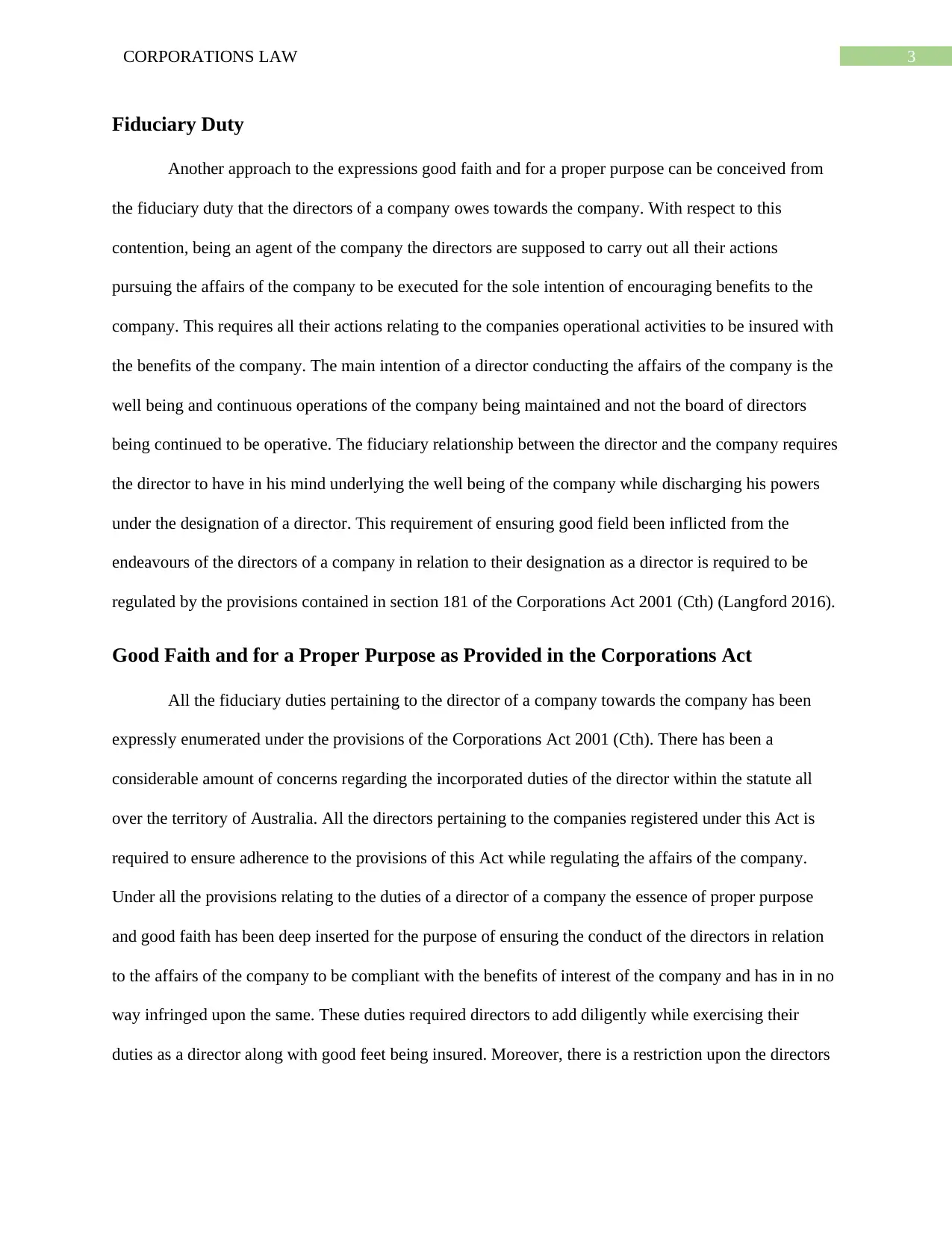
3CORPORATIONS LAW
Fiduciary Duty
Another approach to the expressions good faith and for a proper purpose can be conceived from
the fiduciary duty that the directors of a company owes towards the company. With respect to this
contention, being an agent of the company the directors are supposed to carry out all their actions
pursuing the affairs of the company to be executed for the sole intention of encouraging benefits to the
company. This requires all their actions relating to the companies operational activities to be insured with
the benefits of the company. The main intention of a director conducting the affairs of the company is the
well being and continuous operations of the company being maintained and not the board of directors
being continued to be operative. The fiduciary relationship between the director and the company requires
the director to have in his mind underlying the well being of the company while discharging his powers
under the designation of a director. This requirement of ensuring good field been inflicted from the
endeavours of the directors of a company in relation to their designation as a director is required to be
regulated by the provisions contained in section 181 of the Corporations Act 2001 (Cth) (Langford 2016).
Good Faith and for a Proper Purpose as Provided in the Corporations Act
All the fiduciary duties pertaining to the director of a company towards the company has been
expressly enumerated under the provisions of the Corporations Act 2001 (Cth). There has been a
considerable amount of concerns regarding the incorporated duties of the director within the statute all
over the territory of Australia. All the directors pertaining to the companies registered under this Act is
required to ensure adherence to the provisions of this Act while regulating the affairs of the company.
Under all the provisions relating to the duties of a director of a company the essence of proper purpose
and good faith has been deep inserted for the purpose of ensuring the conduct of the directors in relation
to the affairs of the company to be compliant with the benefits of interest of the company and has in in no
way infringed upon the same. These duties required directors to add diligently while exercising their
duties as a director along with good feet being insured. Moreover, there is a restriction upon the directors
Fiduciary Duty
Another approach to the expressions good faith and for a proper purpose can be conceived from
the fiduciary duty that the directors of a company owes towards the company. With respect to this
contention, being an agent of the company the directors are supposed to carry out all their actions
pursuing the affairs of the company to be executed for the sole intention of encouraging benefits to the
company. This requires all their actions relating to the companies operational activities to be insured with
the benefits of the company. The main intention of a director conducting the affairs of the company is the
well being and continuous operations of the company being maintained and not the board of directors
being continued to be operative. The fiduciary relationship between the director and the company requires
the director to have in his mind underlying the well being of the company while discharging his powers
under the designation of a director. This requirement of ensuring good field been inflicted from the
endeavours of the directors of a company in relation to their designation as a director is required to be
regulated by the provisions contained in section 181 of the Corporations Act 2001 (Cth) (Langford 2016).
Good Faith and for a Proper Purpose as Provided in the Corporations Act
All the fiduciary duties pertaining to the director of a company towards the company has been
expressly enumerated under the provisions of the Corporations Act 2001 (Cth). There has been a
considerable amount of concerns regarding the incorporated duties of the director within the statute all
over the territory of Australia. All the directors pertaining to the companies registered under this Act is
required to ensure adherence to the provisions of this Act while regulating the affairs of the company.
Under all the provisions relating to the duties of a director of a company the essence of proper purpose
and good faith has been deep inserted for the purpose of ensuring the conduct of the directors in relation
to the affairs of the company to be compliant with the benefits of interest of the company and has in in no
way infringed upon the same. These duties required directors to add diligently while exercising their
duties as a director along with good feet being insured. Moreover, there is a restriction upon the directors
Paraphrase This Document
Need a fresh take? Get an instant paraphrase of this document with our AI Paraphraser
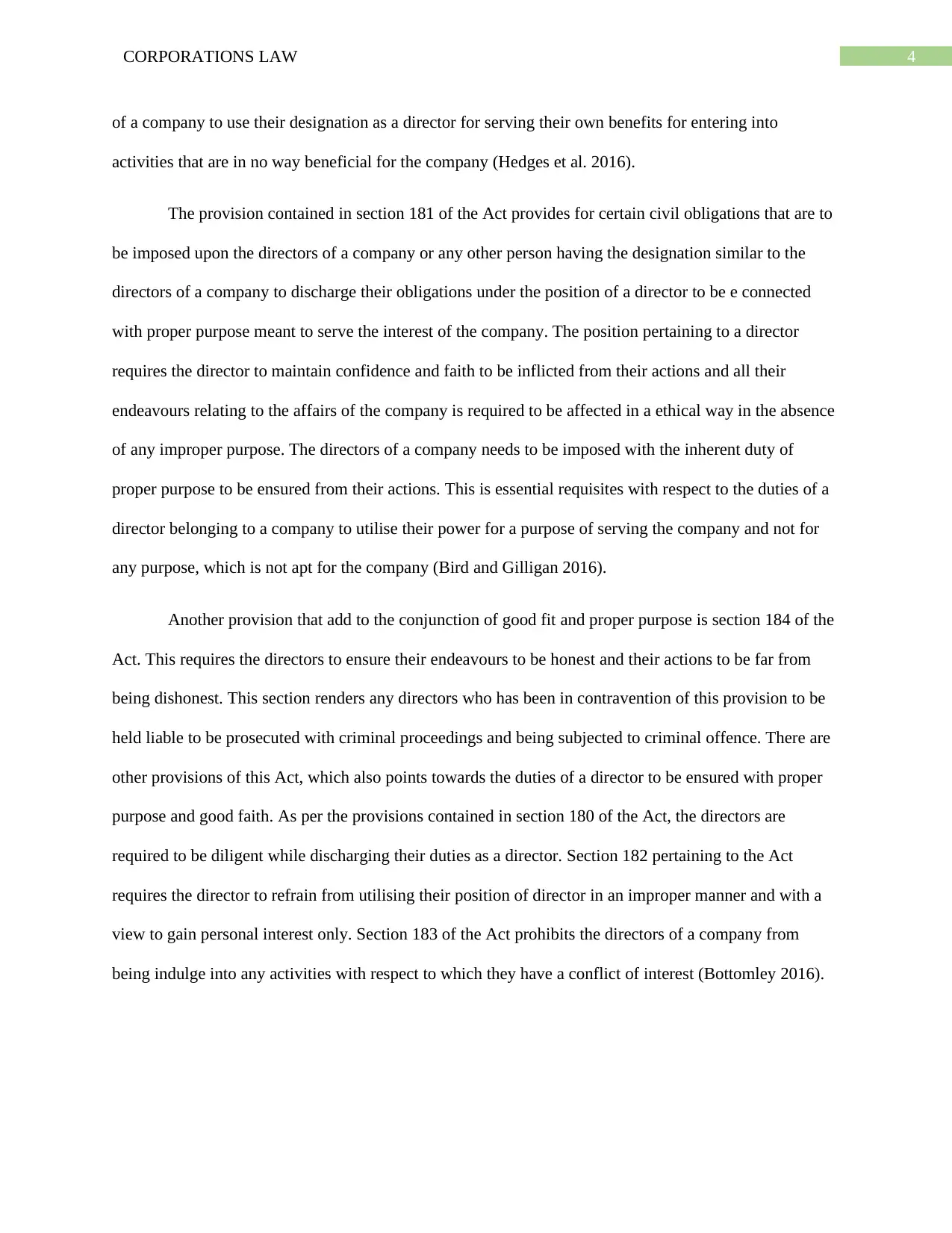
4CORPORATIONS LAW
of a company to use their designation as a director for serving their own benefits for entering into
activities that are in no way beneficial for the company (Hedges et al. 2016).
The provision contained in section 181 of the Act provides for certain civil obligations that are to
be imposed upon the directors of a company or any other person having the designation similar to the
directors of a company to discharge their obligations under the position of a director to be e connected
with proper purpose meant to serve the interest of the company. The position pertaining to a director
requires the director to maintain confidence and faith to be inflicted from their actions and all their
endeavours relating to the affairs of the company is required to be affected in a ethical way in the absence
of any improper purpose. The directors of a company needs to be imposed with the inherent duty of
proper purpose to be ensured from their actions. This is essential requisites with respect to the duties of a
director belonging to a company to utilise their power for a purpose of serving the company and not for
any purpose, which is not apt for the company (Bird and Gilligan 2016).
Another provision that add to the conjunction of good fit and proper purpose is section 184 of the
Act. This requires the directors to ensure their endeavours to be honest and their actions to be far from
being dishonest. This section renders any directors who has been in contravention of this provision to be
held liable to be prosecuted with criminal proceedings and being subjected to criminal offence. There are
other provisions of this Act, which also points towards the duties of a director to be ensured with proper
purpose and good faith. As per the provisions contained in section 180 of the Act, the directors are
required to be diligent while discharging their duties as a director. Section 182 pertaining to the Act
requires the director to refrain from utilising their position of director in an improper manner and with a
view to gain personal interest only. Section 183 of the Act prohibits the directors of a company from
being indulge into any activities with respect to which they have a conflict of interest (Bottomley 2016).
of a company to use their designation as a director for serving their own benefits for entering into
activities that are in no way beneficial for the company (Hedges et al. 2016).
The provision contained in section 181 of the Act provides for certain civil obligations that are to
be imposed upon the directors of a company or any other person having the designation similar to the
directors of a company to discharge their obligations under the position of a director to be e connected
with proper purpose meant to serve the interest of the company. The position pertaining to a director
requires the director to maintain confidence and faith to be inflicted from their actions and all their
endeavours relating to the affairs of the company is required to be affected in a ethical way in the absence
of any improper purpose. The directors of a company needs to be imposed with the inherent duty of
proper purpose to be ensured from their actions. This is essential requisites with respect to the duties of a
director belonging to a company to utilise their power for a purpose of serving the company and not for
any purpose, which is not apt for the company (Bird and Gilligan 2016).
Another provision that add to the conjunction of good fit and proper purpose is section 184 of the
Act. This requires the directors to ensure their endeavours to be honest and their actions to be far from
being dishonest. This section renders any directors who has been in contravention of this provision to be
held liable to be prosecuted with criminal proceedings and being subjected to criminal offence. There are
other provisions of this Act, which also points towards the duties of a director to be ensured with proper
purpose and good faith. As per the provisions contained in section 180 of the Act, the directors are
required to be diligent while discharging their duties as a director. Section 182 pertaining to the Act
requires the director to refrain from utilising their position of director in an improper manner and with a
view to gain personal interest only. Section 183 of the Act prohibits the directors of a company from
being indulge into any activities with respect to which they have a conflict of interest (Bottomley 2016).
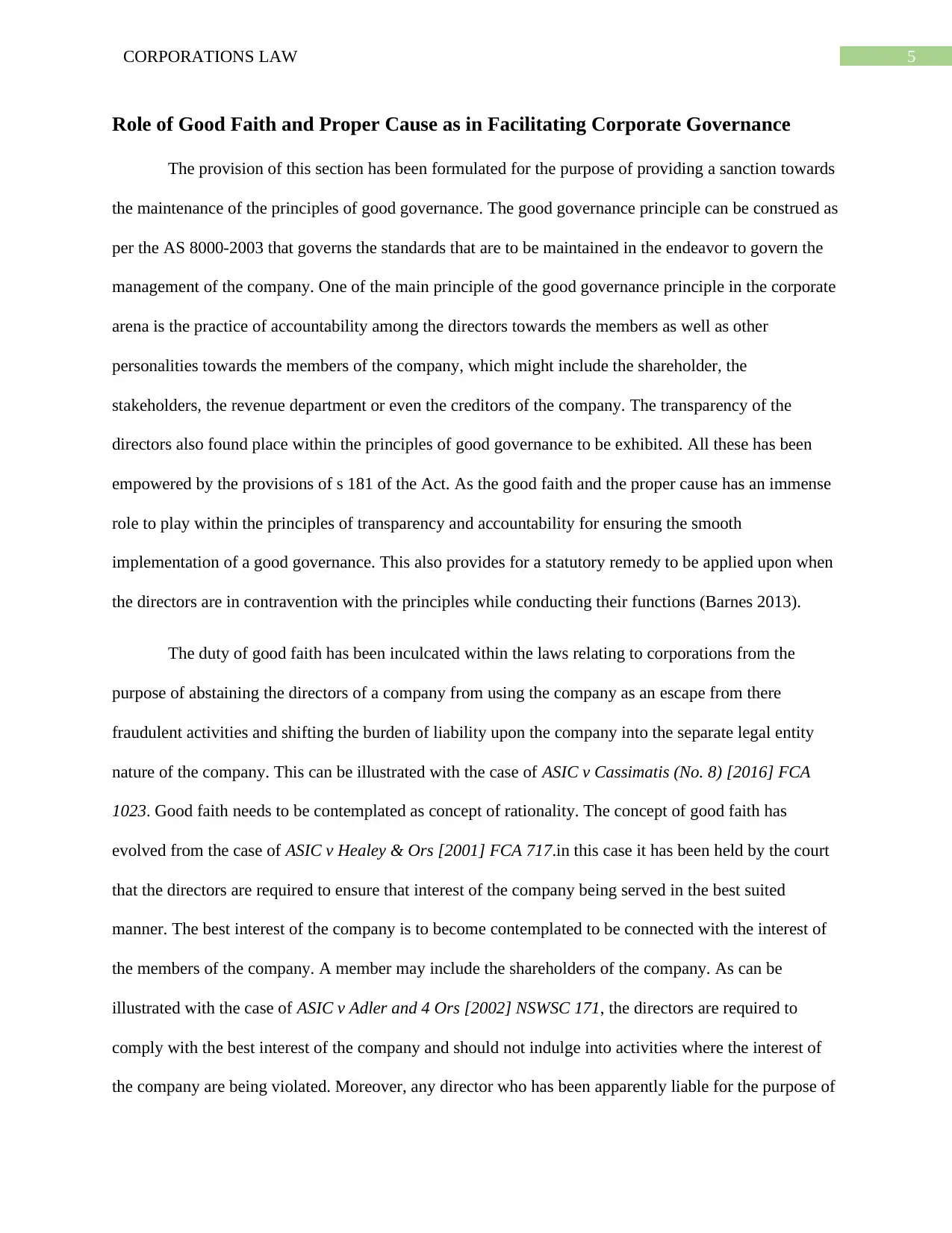
5CORPORATIONS LAW
Role of Good Faith and Proper Cause as in Facilitating Corporate Governance
The provision of this section has been formulated for the purpose of providing a sanction towards
the maintenance of the principles of good governance. The good governance principle can be construed as
per the AS 8000-2003 that governs the standards that are to be maintained in the endeavor to govern the
management of the company. One of the main principle of the good governance principle in the corporate
arena is the practice of accountability among the directors towards the members as well as other
personalities towards the members of the company, which might include the shareholder, the
stakeholders, the revenue department or even the creditors of the company. The transparency of the
directors also found place within the principles of good governance to be exhibited. All these has been
empowered by the provisions of s 181 of the Act. As the good faith and the proper cause has an immense
role to play within the principles of transparency and accountability for ensuring the smooth
implementation of a good governance. This also provides for a statutory remedy to be applied upon when
the directors are in contravention with the principles while conducting their functions (Barnes 2013).
The duty of good faith has been inculcated within the laws relating to corporations from the
purpose of abstaining the directors of a company from using the company as an escape from there
fraudulent activities and shifting the burden of liability upon the company into the separate legal entity
nature of the company. This can be illustrated with the case of ASIC v Cassimatis (No. 8) [2016] FCA
1023. Good faith needs to be contemplated as concept of rationality. The concept of good faith has
evolved from the case of ASIC v Healey & Ors [2001] FCA 717.in this case it has been held by the court
that the directors are required to ensure that interest of the company being served in the best suited
manner. The best interest of the company is to become contemplated to be connected with the interest of
the members of the company. A member may include the shareholders of the company. As can be
illustrated with the case of ASIC v Adler and 4 Ors [2002] NSWSC 171, the directors are required to
comply with the best interest of the company and should not indulge into activities where the interest of
the company are being violated. Moreover, any director who has been apparently liable for the purpose of
Role of Good Faith and Proper Cause as in Facilitating Corporate Governance
The provision of this section has been formulated for the purpose of providing a sanction towards
the maintenance of the principles of good governance. The good governance principle can be construed as
per the AS 8000-2003 that governs the standards that are to be maintained in the endeavor to govern the
management of the company. One of the main principle of the good governance principle in the corporate
arena is the practice of accountability among the directors towards the members as well as other
personalities towards the members of the company, which might include the shareholder, the
stakeholders, the revenue department or even the creditors of the company. The transparency of the
directors also found place within the principles of good governance to be exhibited. All these has been
empowered by the provisions of s 181 of the Act. As the good faith and the proper cause has an immense
role to play within the principles of transparency and accountability for ensuring the smooth
implementation of a good governance. This also provides for a statutory remedy to be applied upon when
the directors are in contravention with the principles while conducting their functions (Barnes 2013).
The duty of good faith has been inculcated within the laws relating to corporations from the
purpose of abstaining the directors of a company from using the company as an escape from there
fraudulent activities and shifting the burden of liability upon the company into the separate legal entity
nature of the company. This can be illustrated with the case of ASIC v Cassimatis (No. 8) [2016] FCA
1023. Good faith needs to be contemplated as concept of rationality. The concept of good faith has
evolved from the case of ASIC v Healey & Ors [2001] FCA 717.in this case it has been held by the court
that the directors are required to ensure that interest of the company being served in the best suited
manner. The best interest of the company is to become contemplated to be connected with the interest of
the members of the company. A member may include the shareholders of the company. As can be
illustrated with the case of ASIC v Adler and 4 Ors [2002] NSWSC 171, the directors are required to
comply with the best interest of the company and should not indulge into activities where the interest of
the company are being violated. Moreover, any director who has been apparently liable for the purpose of
⊘ This is a preview!⊘
Do you want full access?
Subscribe today to unlock all pages.

Trusted by 1+ million students worldwide
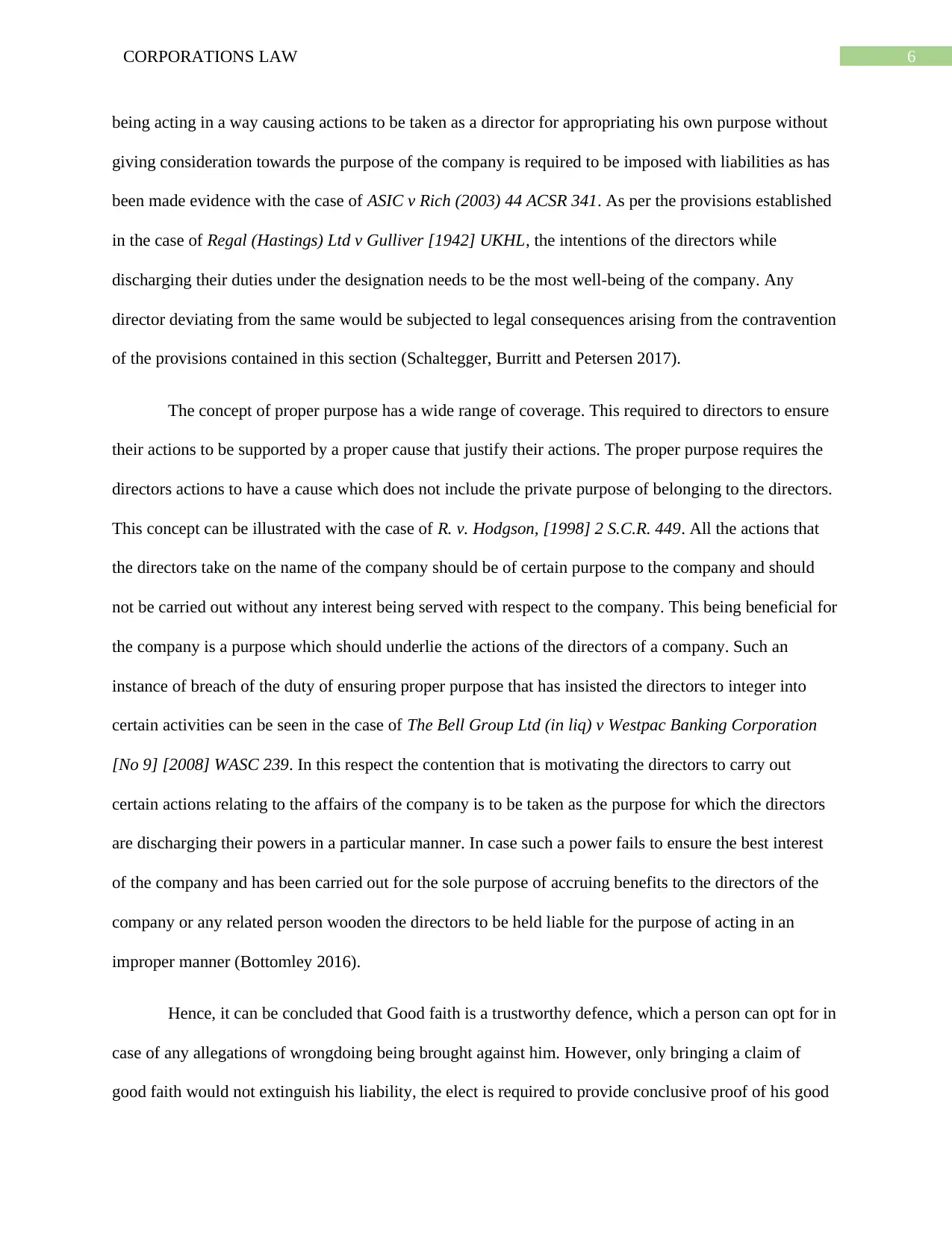
6CORPORATIONS LAW
being acting in a way causing actions to be taken as a director for appropriating his own purpose without
giving consideration towards the purpose of the company is required to be imposed with liabilities as has
been made evidence with the case of ASIC v Rich (2003) 44 ACSR 341. As per the provisions established
in the case of Regal (Hastings) Ltd v Gulliver [1942] UKHL, the intentions of the directors while
discharging their duties under the designation needs to be the most well-being of the company. Any
director deviating from the same would be subjected to legal consequences arising from the contravention
of the provisions contained in this section (Schaltegger, Burritt and Petersen 2017).
The concept of proper purpose has a wide range of coverage. This required to directors to ensure
their actions to be supported by a proper cause that justify their actions. The proper purpose requires the
directors actions to have a cause which does not include the private purpose of belonging to the directors.
This concept can be illustrated with the case of R. v. Hodgson, [1998] 2 S.C.R. 449. All the actions that
the directors take on the name of the company should be of certain purpose to the company and should
not be carried out without any interest being served with respect to the company. This being beneficial for
the company is a purpose which should underlie the actions of the directors of a company. Such an
instance of breach of the duty of ensuring proper purpose that has insisted the directors to integer into
certain activities can be seen in the case of The Bell Group Ltd (in liq) v Westpac Banking Corporation
[No 9] [2008] WASC 239. In this respect the contention that is motivating the directors to carry out
certain actions relating to the affairs of the company is to be taken as the purpose for which the directors
are discharging their powers in a particular manner. In case such a power fails to ensure the best interest
of the company and has been carried out for the sole purpose of accruing benefits to the directors of the
company or any related person wooden the directors to be held liable for the purpose of acting in an
improper manner (Bottomley 2016).
Hence, it can be concluded that Good faith is a trustworthy defence, which a person can opt for in
case of any allegations of wrongdoing being brought against him. However, only bringing a claim of
good faith would not extinguish his liability, the elect is required to provide conclusive proof of his good
being acting in a way causing actions to be taken as a director for appropriating his own purpose without
giving consideration towards the purpose of the company is required to be imposed with liabilities as has
been made evidence with the case of ASIC v Rich (2003) 44 ACSR 341. As per the provisions established
in the case of Regal (Hastings) Ltd v Gulliver [1942] UKHL, the intentions of the directors while
discharging their duties under the designation needs to be the most well-being of the company. Any
director deviating from the same would be subjected to legal consequences arising from the contravention
of the provisions contained in this section (Schaltegger, Burritt and Petersen 2017).
The concept of proper purpose has a wide range of coverage. This required to directors to ensure
their actions to be supported by a proper cause that justify their actions. The proper purpose requires the
directors actions to have a cause which does not include the private purpose of belonging to the directors.
This concept can be illustrated with the case of R. v. Hodgson, [1998] 2 S.C.R. 449. All the actions that
the directors take on the name of the company should be of certain purpose to the company and should
not be carried out without any interest being served with respect to the company. This being beneficial for
the company is a purpose which should underlie the actions of the directors of a company. Such an
instance of breach of the duty of ensuring proper purpose that has insisted the directors to integer into
certain activities can be seen in the case of The Bell Group Ltd (in liq) v Westpac Banking Corporation
[No 9] [2008] WASC 239. In this respect the contention that is motivating the directors to carry out
certain actions relating to the affairs of the company is to be taken as the purpose for which the directors
are discharging their powers in a particular manner. In case such a power fails to ensure the best interest
of the company and has been carried out for the sole purpose of accruing benefits to the directors of the
company or any related person wooden the directors to be held liable for the purpose of acting in an
improper manner (Bottomley 2016).
Hence, it can be concluded that Good faith is a trustworthy defence, which a person can opt for in
case of any allegations of wrongdoing being brought against him. However, only bringing a claim of
good faith would not extinguish his liability, the elect is required to provide conclusive proof of his good
Paraphrase This Document
Need a fresh take? Get an instant paraphrase of this document with our AI Paraphraser
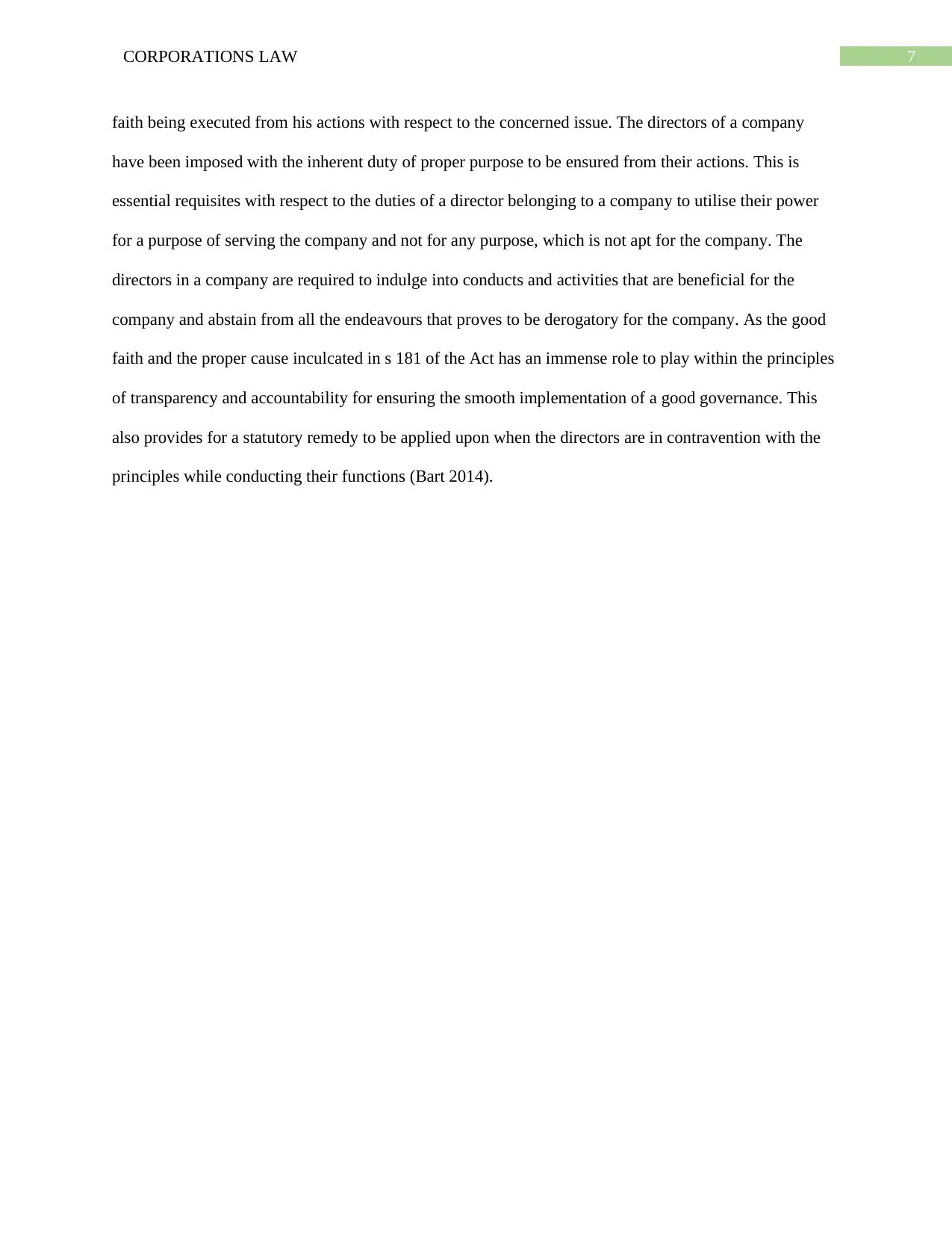
7CORPORATIONS LAW
faith being executed from his actions with respect to the concerned issue. The directors of a company
have been imposed with the inherent duty of proper purpose to be ensured from their actions. This is
essential requisites with respect to the duties of a director belonging to a company to utilise their power
for a purpose of serving the company and not for any purpose, which is not apt for the company. The
directors in a company are required to indulge into conducts and activities that are beneficial for the
company and abstain from all the endeavours that proves to be derogatory for the company. As the good
faith and the proper cause inculcated in s 181 of the Act has an immense role to play within the principles
of transparency and accountability for ensuring the smooth implementation of a good governance. This
also provides for a statutory remedy to be applied upon when the directors are in contravention with the
principles while conducting their functions (Bart 2014).
faith being executed from his actions with respect to the concerned issue. The directors of a company
have been imposed with the inherent duty of proper purpose to be ensured from their actions. This is
essential requisites with respect to the duties of a director belonging to a company to utilise their power
for a purpose of serving the company and not for any purpose, which is not apt for the company. The
directors in a company are required to indulge into conducts and activities that are beneficial for the
company and abstain from all the endeavours that proves to be derogatory for the company. As the good
faith and the proper cause inculcated in s 181 of the Act has an immense role to play within the principles
of transparency and accountability for ensuring the smooth implementation of a good governance. This
also provides for a statutory remedy to be applied upon when the directors are in contravention with the
principles while conducting their functions (Bart 2014).
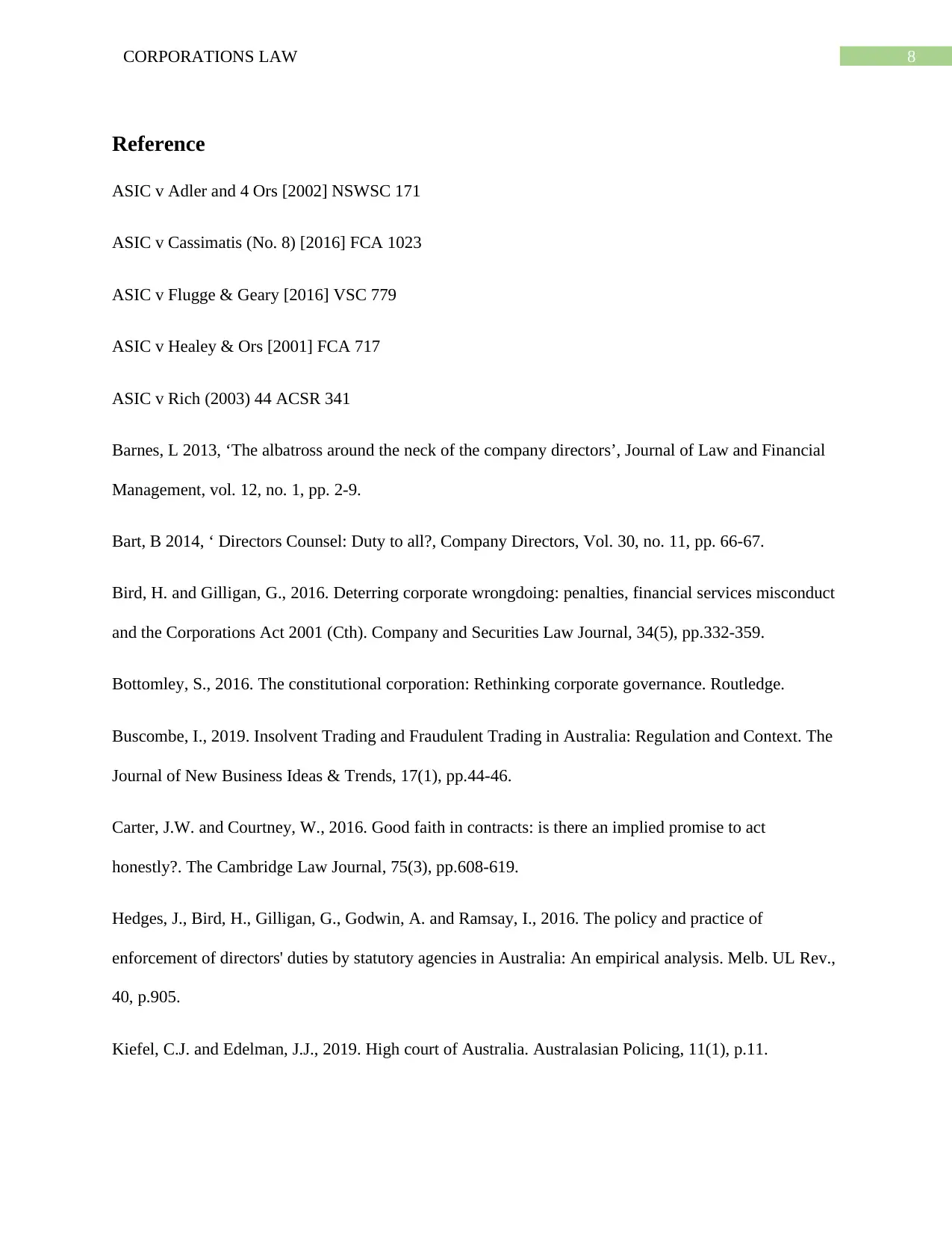
8CORPORATIONS LAW
Reference
ASIC v Adler and 4 Ors [2002] NSWSC 171
ASIC v Cassimatis (No. 8) [2016] FCA 1023
ASIC v Flugge & Geary [2016] VSC 779
ASIC v Healey & Ors [2001] FCA 717
ASIC v Rich (2003) 44 ACSR 341
Barnes, L 2013, ‘The albatross around the neck of the company directors’, Journal of Law and Financial
Management, vol. 12, no. 1, pp. 2-9.
Bart, B 2014, ‘ Directors Counsel: Duty to all?, Company Directors, Vol. 30, no. 11, pp. 66-67.
Bird, H. and Gilligan, G., 2016. Deterring corporate wrongdoing: penalties, financial services misconduct
and the Corporations Act 2001 (Cth). Company and Securities Law Journal, 34(5), pp.332-359.
Bottomley, S., 2016. The constitutional corporation: Rethinking corporate governance. Routledge.
Buscombe, I., 2019. Insolvent Trading and Fraudulent Trading in Australia: Regulation and Context. The
Journal of New Business Ideas & Trends, 17(1), pp.44-46.
Carter, J.W. and Courtney, W., 2016. Good faith in contracts: is there an implied promise to act
honestly?. The Cambridge Law Journal, 75(3), pp.608-619.
Hedges, J., Bird, H., Gilligan, G., Godwin, A. and Ramsay, I., 2016. The policy and practice of
enforcement of directors' duties by statutory agencies in Australia: An empirical analysis. Melb. UL Rev.,
40, p.905.
Kiefel, C.J. and Edelman, J.J., 2019. High court of Australia. Australasian Policing, 11(1), p.11.
Reference
ASIC v Adler and 4 Ors [2002] NSWSC 171
ASIC v Cassimatis (No. 8) [2016] FCA 1023
ASIC v Flugge & Geary [2016] VSC 779
ASIC v Healey & Ors [2001] FCA 717
ASIC v Rich (2003) 44 ACSR 341
Barnes, L 2013, ‘The albatross around the neck of the company directors’, Journal of Law and Financial
Management, vol. 12, no. 1, pp. 2-9.
Bart, B 2014, ‘ Directors Counsel: Duty to all?, Company Directors, Vol. 30, no. 11, pp. 66-67.
Bird, H. and Gilligan, G., 2016. Deterring corporate wrongdoing: penalties, financial services misconduct
and the Corporations Act 2001 (Cth). Company and Securities Law Journal, 34(5), pp.332-359.
Bottomley, S., 2016. The constitutional corporation: Rethinking corporate governance. Routledge.
Buscombe, I., 2019. Insolvent Trading and Fraudulent Trading in Australia: Regulation and Context. The
Journal of New Business Ideas & Trends, 17(1), pp.44-46.
Carter, J.W. and Courtney, W., 2016. Good faith in contracts: is there an implied promise to act
honestly?. The Cambridge Law Journal, 75(3), pp.608-619.
Hedges, J., Bird, H., Gilligan, G., Godwin, A. and Ramsay, I., 2016. The policy and practice of
enforcement of directors' duties by statutory agencies in Australia: An empirical analysis. Melb. UL Rev.,
40, p.905.
Kiefel, C.J. and Edelman, J.J., 2019. High court of Australia. Australasian Policing, 11(1), p.11.
⊘ This is a preview!⊘
Do you want full access?
Subscribe today to unlock all pages.

Trusted by 1+ million students worldwide
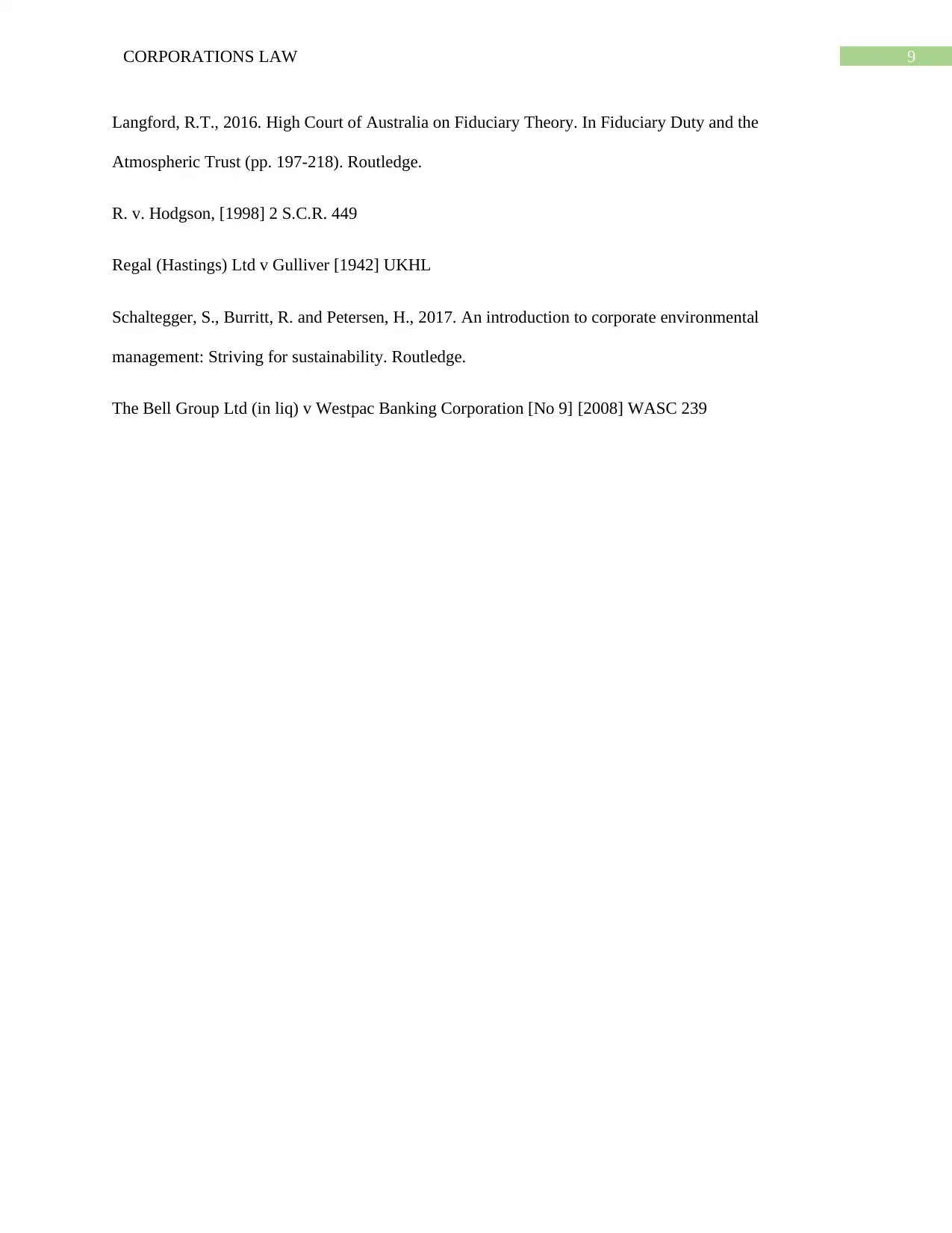
9CORPORATIONS LAW
Langford, R.T., 2016. High Court of Australia on Fiduciary Theory. In Fiduciary Duty and the
Atmospheric Trust (pp. 197-218). Routledge.
R. v. Hodgson, [1998] 2 S.C.R. 449
Regal (Hastings) Ltd v Gulliver [1942] UKHL
Schaltegger, S., Burritt, R. and Petersen, H., 2017. An introduction to corporate environmental
management: Striving for sustainability. Routledge.
The Bell Group Ltd (in liq) v Westpac Banking Corporation [No 9] [2008] WASC 239
Langford, R.T., 2016. High Court of Australia on Fiduciary Theory. In Fiduciary Duty and the
Atmospheric Trust (pp. 197-218). Routledge.
R. v. Hodgson, [1998] 2 S.C.R. 449
Regal (Hastings) Ltd v Gulliver [1942] UKHL
Schaltegger, S., Burritt, R. and Petersen, H., 2017. An introduction to corporate environmental
management: Striving for sustainability. Routledge.
The Bell Group Ltd (in liq) v Westpac Banking Corporation [No 9] [2008] WASC 239
1 out of 10
Related Documents
Your All-in-One AI-Powered Toolkit for Academic Success.
+13062052269
info@desklib.com
Available 24*7 on WhatsApp / Email
![[object Object]](/_next/static/media/star-bottom.7253800d.svg)
Unlock your academic potential
Copyright © 2020–2025 A2Z Services. All Rights Reserved. Developed and managed by ZUCOL.





